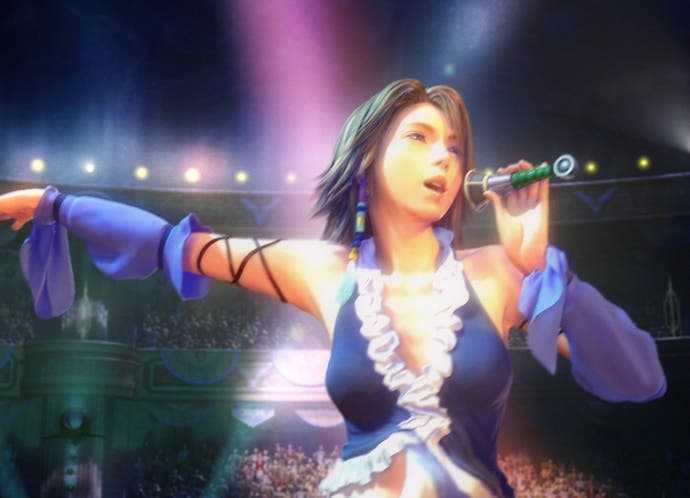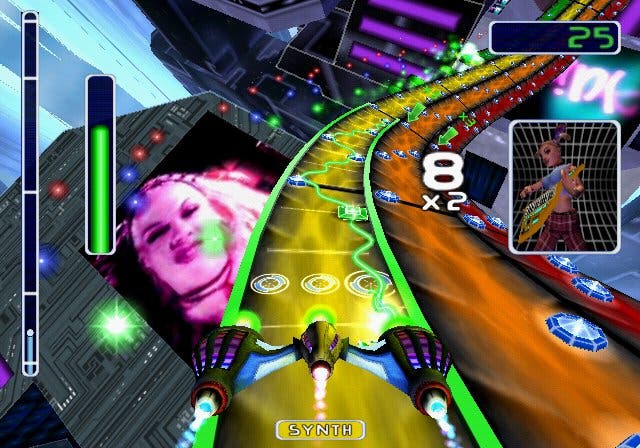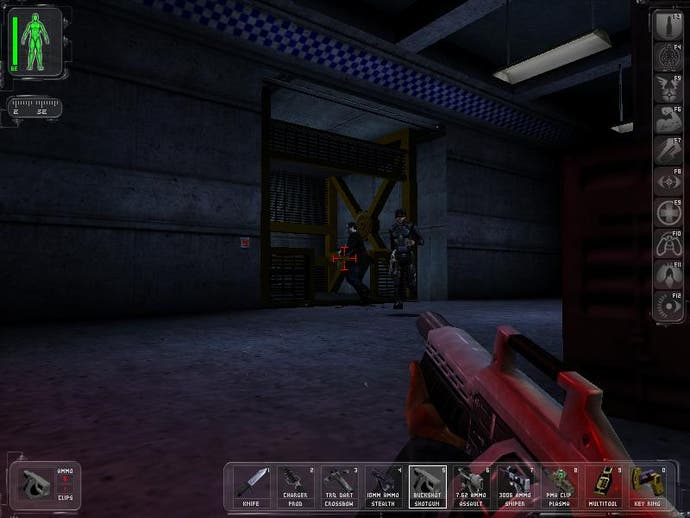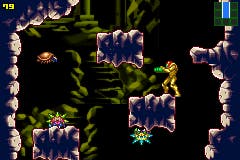Reader Reviews
Your thoughts on Final Fantasy X-2, Amplitude, Deus Ex and Metroid: Zero Mission.
There will be no review of Mark's Christmas dinner because he doesn't want to offend anybody, which kind of tells its own story in a way. (A story of broken promises and deceit.) Ours though was extremely pleasant, with all the trimmings present and correct and a smashing array of pre-lunch Christmas morning nibbles including carrots with dip, salmon and chorizo bits (there was some sort of biscuit involved in the former, we seem to recall, although the port and brandy kind of fogs that side of our memory), and a Christmas pudding that must have burned for about half a minute before imploding in a manner that gave the lie to an exterior that screamed "richness and plenty!" leaving a saggy old alcoholic lying in the gutter having just coughed up guts its up. Tasted pretty good anyway though. It was certainly better than Halo in our view, which we've never been in the least bit tempted to put in our mouths.
And we can only assume that having over-indulged at Christmas you're all too busy rubbing your tummies to gobble up our demands for more reader-submitted reviews, because we haven't seen all that many recently. Of course, if you want to see something you've written immortalised on these pages, all you have to do is follow the instructions at the bottom. So go on. Follow the example of this little band and show your fellow readers some love. By directing them to buy good games, that is; they can almost certainly find their own pornography by now. And on that bombshell!
Oh, it's not a bombshell; it's a P45.
The No Christmas Dinners Edition...
Final Fantasy X-2 (PS2)
- by tengu

Basically it's Final Fantasy X, but it has added singing, dancing, and girlies playing 'dress-up' during combat. Except it isn't half as downbeat as FFX was. In fact, it's downright cheery is FFX-2.
See Yuna sing...
Playing as Final Fantasy X heroines Yuna and Rikku and new character Paine, you play through the usual sprawling RPG quest, but broken up into various 'missions' that take place in all the familiar locations from FFX, plus a few new locations on occasion. The story this time around being about Yuna becoming a 'sphere hunter' and travelling the world in search of spheres, hoping to find out what has become of FFX's hero Tidus (AKA 'he who must not be named').
The game does a good job of easing you into things right from the start, with it's new 'dress sphere' based combat system giving a variety of costumes that you can change into during the battles, each with their own unique powers and abilities, to acquire and master as the game progresses. It's all very easy to pick up, if perhaps a tad 'simple' compared to the 'sphere grid' character growth system from FFX. It does have the comfortably familiar experience points that were missing from FFX though and sees the return of the 'turn bar' that determines when you get your turn, which is a big plus in my book, as I liked it in older FF games.
See Yuna dance...
The most charming aspect of this game is its sense of fun. A lot of RPGs rely heavily on dark, brooding settings and angst ridden central characters with some kind of dark past they can't remember or some such variation on this theme, while FFX-2 has nothing of the sort. This is RPG at their most light-hearted. It starts out simple, it's fun, and while later in the game it does become slightly more serious, it still manages to stay light enough to retain that sense of fun that gives it its unique charm. Although, I can see how it might feel a bit 'girlie' for some folk.
It is very easy though, with the fights overall being very quick affairs and the bosses all being absolute pushovers. Only some of the optional sub-quests provide any real kind of challenge. The game does, however, encourage you to play through multiple times in order to see everything it has to offer, letting you carry over acquired items and dress spheres into a new game from the beginning upon completion, giving it a lot of longevity. So long as you're willing to put the time in obviously.
See Yuna jump around in her underpants.
The game does have some downsides to it, I will admit that, most noticeable being the expected horrible PAL conversion we always get from Square-Enix with the obligatory mammoth black borders. The game itself lacks the 'epic' feel that you get from other Final Fantasy games, it does still utilise the much reviled 'random battle' structure you get in just about every RPG going, plus you have to constantly revisit locations you had to constantly revisit in FFX, which can get repetitive, and it IS more camp than a bunch of WWE wrestlers pitching a row of tents in Graham Norton's back yard, but these things mean squat to me in all honesty. I know what I like.
I have been through this game a number of times now, and I still derive much pleasure from playing it. I've heard others pan it something rotten on more than one occasion, but they don't know what they're missing. I really love this game, I'm comfortable enough in my sexuality to admit that, and I would argue with anyone who has a go at it. Then again, I'll eat up any old JRPG pap that comes my way with glee, so long as it doesn't have 'Zoids' in its title that is. So my opinion may be somewhat biased. Doesn't make this any less a brilliant game though.
Its great fun, it's clean and inoffensive (Unless you're offended by scantily clad women and Yuna's cousin constantly making advances on her, of course), it's very easy to get into and play and it looks and sounds fantastic. This is the perfect game if you're getting tired of the 'by the numbers' nature of a lot of RPGs.
I'm not going to give this a rating, because numbers are not always the best measure of fun.
Amplitude (PS2)
- by HairyArse

Amplitude is the sequel to the warmly received 2002 musical mix-'em-up that was Frequency. For those who missed the fantastic original, let me give you a quick refresher. Freqeuncy and Amplitude at their most basic levels simply require you to press a combination of left, right and middle buttons in time with the music. Similar in some respects to Parappa the Rapper and Um Jammer Lammy, but with the difficulty ramped up ten fold. Sound simple? Well let me assure you it's not!
The concept behind Amplitude is relatively straightforward. Songs are broken up into tracks or channels, consisting of drums, bass, vocals, synth, FX and guitar. As the songs progress, it's your job to activate eight or so consecutive beats for each channel by firing a 'sonic energy' burst at them. The beats are positioned on either the left, right or middle of each channel, with L1, Triangle and R2 respectively used to trigger the sonic bursts. The X button is also used to activate the game's various power-ups, which include auto-blaster, multiplier, freestyle and slow-mo. Every beat missed equals a loss of energy from the power bar, which when completely extinguished means game-over.
Amplitude is one of those games that can both exhilarate and frustrate you at the same time. The furious finger gymnastics required to complete songs on the insane difficulty setting can at first seem daunting and often lead to McEnroe-esque exclamations of “You cannot be serious!” Particularly when faced with the near impossible task of playing some of the more difficult tunes such as punk/pop number “The Rock Show” by Blink 182. However, if you stick with it and persevere, Amplitude soon rewards your patience and more often than not, you'll find yourself “in the zone” - playing out of your skin and stringing together intricate, complex combos that at first seemed a million miles away.
And therein lies the game's genius. The old adage of practice making perfect has never been more apt. Amplitude rewards your persistence and what at first might seem to be verging on the ridiculous soon becomes second nature and the glowing feeling you get when nailing a particularly troublesome segment of a song is an emotion rarely matched in games these days. You can't fluke this game, only by using genuine skill will you proceed and this refreshing aspect is one of the game's main draws.
While Frequency relied on dance and Hip-Hop tunes to keep your head nodding and your toes tapping, Amplitude caters for a whole range of musical genres by including pop songs from Pink and Garbage, electronic efforts from the like of Frequency residents BT and Freezepop as well as monster rock efforts from Papa Roach and Slip Knot. This variety works in some respects as it makes the game appeal to a wide and assorted audience, but personally I felt such variety was a negative as you're increasingly likely to dislike more songs than you would were the songs all of a similar genre.
Harmonix also managed to successfully integrate online play into Amplitude using the PlayStation 2 network adapter. As well as offering an offline multiplayer mode which while not as intense and rewarding as single player, does offer a fulfilling alternative. My favourite mode being Duel, in which the first player, or freq, as they're referred to in the game, must lay down a series of beats which the other player must match faultlessly. The competition soon heats up and it's this type of intense counteraction that ultimately leads to many compelling and spirited sessions.
8 out of 10
Deus Ex (PC)
- by freedumb

“Civilization is near collapse, the world economy is in chaos, and deadly viruses ravage the earth.” (blurb on the back of the box). You play the role of JC Denton, a biomodified super agent, deployed for anti-terrorist measures. You’re also a rookie, and in many ways a continuation of a controlled experiment. Created by developer Ion Storm in 2000, the key mastermind being renowned Studio Director Warren Spector. Deus Ex happens to be a lengthy, time-consuming, complex, comprehensive, often demanding and challenging encounter, with a steep learning curve.
Deus Ex is set in a believable world either enhanced or damaged by life-changing technology (such as legal or illegal human biomodification which uses Nanotechnology), with hints of science fiction but marred by similar problems to those known in the world of today. A world of intrigue and realistic government conspiracies, secret shadowy organizations that have existed for eons, replete with Inner Circles pulling the puppet strings of world leaders to suit their own ends. Also included are the familiar rug-pulling plot twists and nefarious but charismatic villains. You could call it clichéd in that sense, though the way it’s played out certainly isn’t; as it deals effectively with complex social, political and philosophical issues in an appealing way.
There are more some remarkable characters within the story (and this includes JC’s suave, cool and collected manner). There’s Chad Dumier, leader of the Silhouette organizational rebel uprising, a principled man but somewhat “unethical” in his tactics. Gunther Hermann, a ferocious Arnie-like agent, hilarious but creepy, who stops at nothing and no one to scale the heights of recognition and victory. Anna Navarre, a cold, ruthless, mysterious agent who’s hard to trust. Walter Simons, a fascinatingly charming but hard-hearted villain and Bob Page, powerful but deceitful mogul who charades as a public welfare crusader, but houses ambitious and forbidding aims. These just scratch the surface of the wealth of interesting personalities you’ll find.
Deus Ex is a seminal game, as its main gameplay idea is one of freedom. You dictate how you play, as the game throws a multitude of questions at you. What multiple-choice responses do you make in conversations (eg. do you bribe someone for information, insult their ideas, agree with them, agree to help them, lie to them etc.), who do you ally with or work against? What tools do you pick up or use, what tallied skill points do you develop and in what quantity, or what biomodification augmentations to install and upgrade? These are all questions that only the individual player can answer, and choose from. In effect this makes each person’s game a distinctive experience.
The freedom isn’t in the sense that you can actually go absolutely anywhere you please, but where you’re deployed, or whatever you’re told to do, you decide how to solve the problems in your own way. It has been designed for the player to experiment with a huge array of possible options, or even create their own. These options also allow for ‘emergence’ in gameplay, which is that different and unexpected outcomes can result, or ‘emerge’ from whatever approach you choose to take. There are even three separate endings that can play out from the choices you make throughout the entire adventure.
Deus Ex takes you on a globe-trotting adventure, some highlights include frequenting in the bowels of “Hell’s Kitchen” (New York), a den of prostitutes and corrupt government officials (or was that somewhere else? My memory’s a bit hazy). Hong Kong, a city caught up in Triad warfare, purposefully incited by imperceptible major players. Or even occupied Paris (you’ll have to find out for yourselves exactly “who” occupies the city), concealing catacombs of insurgent activity - again these are just some flashes of the myriad locations. There’s also a brilliant, varied, scene-setting and mood changing soundtrack to go with these locations (check it out here if you’re interested).
Remarkable idiosyncrasies also present themselves and manage to work convincingly in the atmosphere of the game. Nanotech-enhanced super agents, Area 51 and the ability to walk into a bar, engage in conversation for information (sometimes “bribable”), have a drink and leave intoxicated, screen blurring utilized effectively. Spector presents a world you can get lost in with enigmatic characters and concepts, snippets of narrative teasingly revealed in readable book extracts, data cubes, personal emails accessed on hacked computer systems, intercom links and crossovers wired into consciousness like a personal radio chip in your brain; encouraging or hampering your progress, be they friend or foe. I could go on and on. A thriving black market trade which you can freely indulge in, automated security bots whose circuits can be scrambled over to your side, AI Constructs with ideologies of world domination, revolutionaries who seek enlightenment via unreasonable utopian dreams…
As a player you had that uneasy feeling, that rare sense that you are just a pawn in a very high-ranking chess game between some major players, a mystifying chess game, where a definable finale is unpredictable. It’s a darkly humoured dystopia, a unique atmosphere that no other game seems to have quite matched. It isn’t even as depressing as it sounds, managing to remain a lot of fun, while messing about with so many options and enjoying the characters, soaking in and absorbing the wonderful dialogue and script. You’ll laugh, you’ll cry, you’ll love, you’ll feel awkward, you’ll feel pathos, you’ll come to hate, you’ll be confused at times and then have your questions answered, with more questions arising in all three of the endings.
There are no black and white, right or wrong decisions, instead are the various shades of grey. All that’s left is to enter the machine, and make your own experience; if you dare. Still the best game ever I reckon. Just remember to trust no one, including yourself.
10 out of 10
Metroid: Zero Mission (GBA)
- by deathgibbon

As seems to be the Nintendo policy these days, here comes a remake, this time in the form of Metroid glammed up for GBA. But is it any good? Is it better than Fusion? Is it better than Prime? Read on to find out.
The game doesn't really have a story, but as usual you start the game with next to nothing. But, in the typical Metroid way, you start to pick things up pretty quickly, and are blasting Metroids into next week in no time. All of the old upgrades are back in Zero Mission such as Screw Attack (Stop laughing at the back), Super Missiles, and the Speed Booster. All of these help you in your quest to defeat Mother Brain in some way or form. None of these items are there for show. Everything has a piece to play.
And that's what makes Zero Mission so good. Almost nothing is there for the sake of it. See that ledge that is just next to a wall? You can probably get a Missile Tank if you climb up there. But this also raises a problem. There's simply too much to do and you never know exactly whether a Tank is hidden or not. Okay, so I'm grasping at straws here, but you really have to inspect every little nook and cranny to get 100 per cent at the Game Credits. So let's say you come up to a boss (They're not very hard this time round, which I'll come to later). You seem to be fairly well equipped for this battle. You've collected everything you've seen so BRING IT ON! Within moments you'll be dead. Some could argue that someone who plays Metroid games like this shouldn't be playing Metroid games, but it's pretty unfair.
Since Zero Mission is just Metroid except with all the trimmings, it obviously looks a damn sight nicer than its NES counterpart. Walls crumble when you walk past them. When enemies are killed they explode with a little wisp of smoke left behind. If you watch Samus's body when she jumps, you'll notice subtle movements in her legs and arms. I could say something else about animation, but it would ruin the second half of the game.
Now, since the GBA is essentially a SNES in your pocket, the sound isn't exactly a symphony orchestra. Yes, it's very atmospheric at times and can create immense amounts of tension, but the whole soundtrack consists of 'bleeps' and 'blops'. Not impressive, but when you're playing a game as immersive as Zero Mission, who's going to notice?
Anybody that's been frightened off by Metroid Fusion's horrid difficulty level, no need to be scared now. Zero Mission is significantly easier than it's predecessor. The only boss I had any problems with was Mother Brain. So anyone expecting another Nightmare somewhere throughout the game, you can go and pick this up without fear. An easy Metroid game, I hear you say? Why, this is heresy from Nintendo, you say. Well, partly it is. Fusion and Prime were so challenging, why wasn't ZM? Maybe Nintendo wanted to branch out to Joe Public, but I don't think a game about a space hunter shooting aliens was ever going to appeal to most people, so Nintendo shouldn't have changed it really.
Now, the lifespan. How long's it going to last you? Zero Mission has received some flak for being way too short and I would agree. It took me around four hours to finish, and that's on the top end of the scale. So if you stick with it, you could complete it in one sitting and have time to take it back to the shop later! Bargain!
So now the most important factor of a game comes forward for trial. The gameplay. It's the old Metroid formula. B to Shoot, A to Jump, R for Missiles. It's nothing radically different, but the whole thing plays like a dream. Everything is so fluid, and you'll slap your head when you mistakes because you know it's your own fault. The whole game premise is so simple and yet so deep at the same time. Marvellous stuff.
More Nintendo magic for your pocket. A flawed gem that I would recommend any GBA owner to pick up.
8 out of 10
Disclaimers and Submissions: Reviews do not necessarily reflect the views of Eurogamer or its writers. Whilst reviews are lightly edited for obvious spelling errors and swearing (stop it!), unfortunately we do not have the time to sit around picking through your copy all day long (much as we'd like to), so please ensure that all reviews are submitted as you would like to see them appear on the site. We also ask that you try and stick to a reasonable length or we may have to cut out the odd chunk or even hold your review over for a future instalment - although we will attempt to post everything we're sent in as timely a manner as possible. If that doesn't put you off, then you can submit your reviews (in plain text please!) to the usual address.

